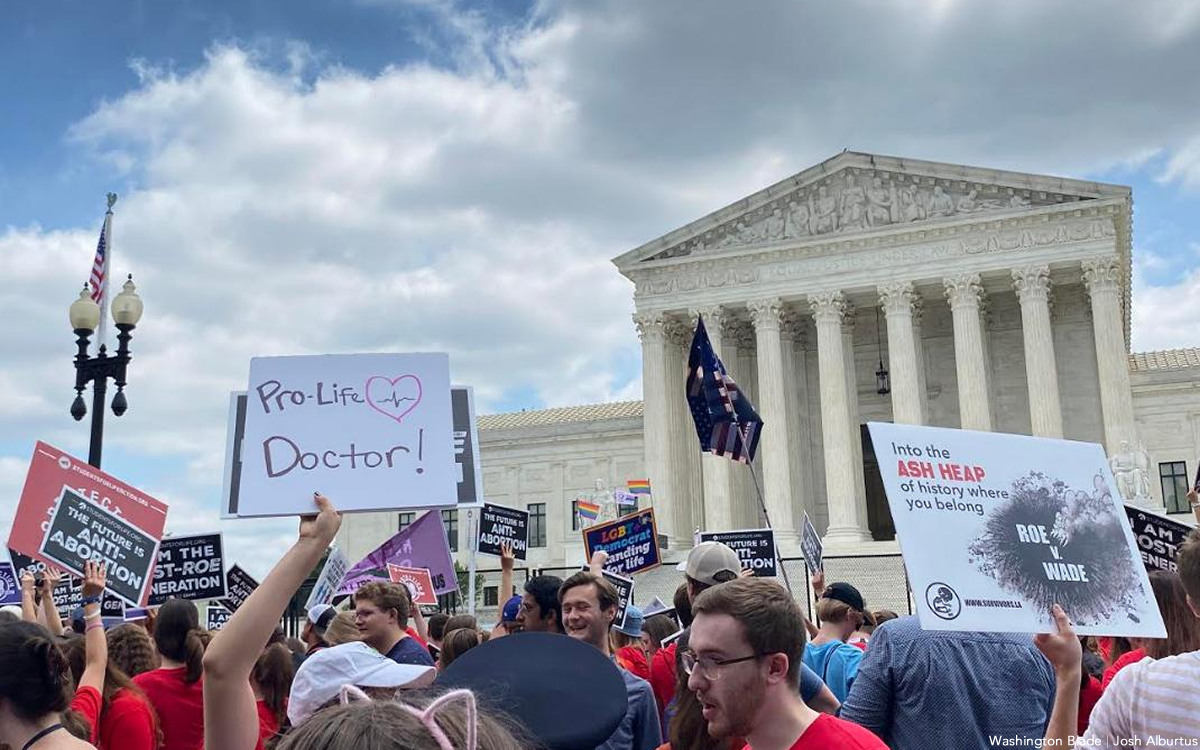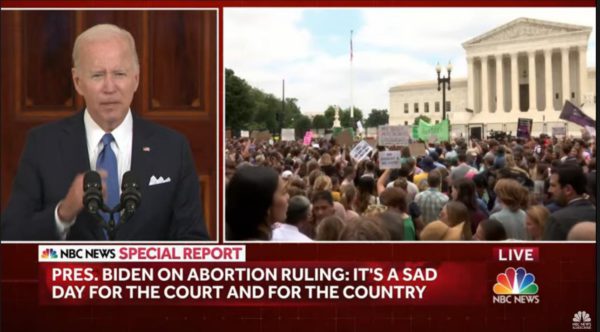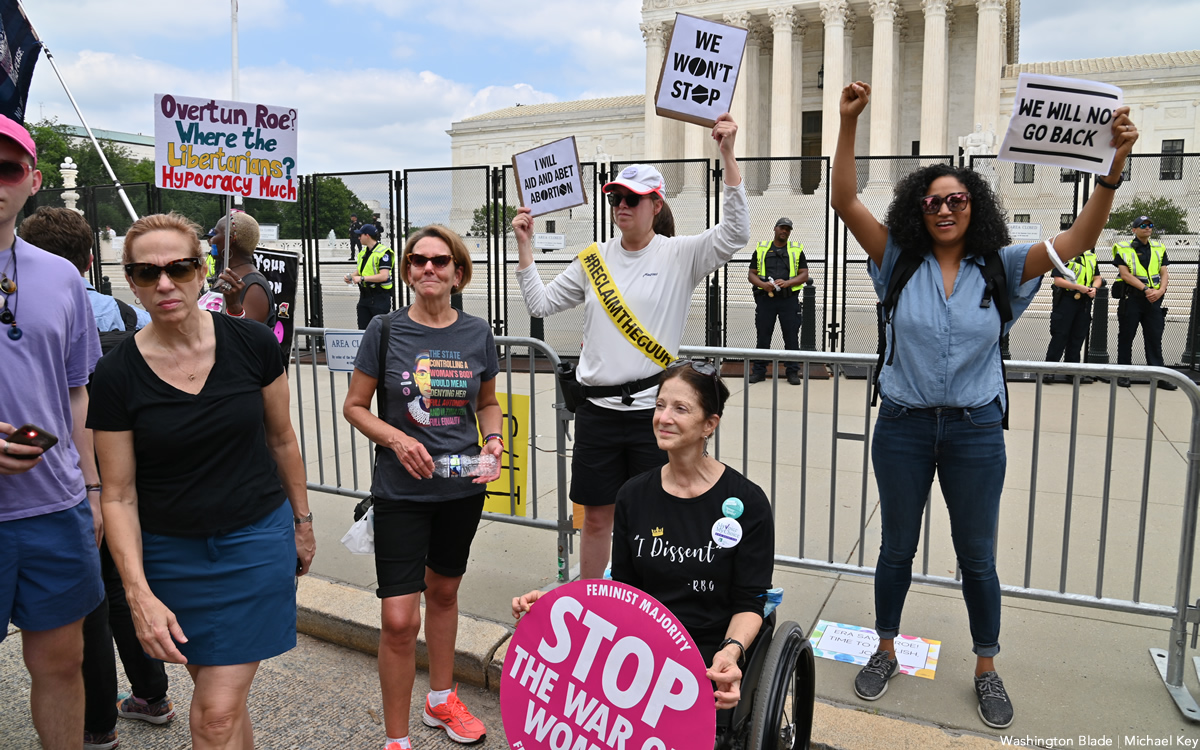U.S. Supreme Court
U.S. Supreme Court overturns Roe v. Wade
Justices issued 6-3 ruling

The U.S. Supreme Court on Friday in a 6-3 ruling overturned Roe v. Wade.
Justice Clarence Thomas in the decision said the Supreme Court should also reconsider the decisions in the Obergefell and Lawrence cases that extended marriage equality to same-sex couples and the right to private, consensual sex.
LGBTQ rights groups were quick to condemn the ruling.
“Today the Supreme Court issued a devastating ruling in Jackson Women’s Health Organization v. Dobbs — a huge setback to our long-standing fundamental right to bodily autonomy,” said National LGBTQ Task Force Executive Director Kierra Johnson. “This decision by the conservative majority on the bench also marks the beginning of the vital work to re-establish our constitutional foundation for reproductive justice and freedom. We must redouble our work to protect access to abortion and reproductive justice at the state and national levels. We will never give up.”
“When the Supreme Court is willing to throw 50 years of precedent out the window, it proves that we are at an exceedingly dangerous, unprecedented moment. The court’s majority opinion does not reflect the will of our nation — two thirds of whom support Roe v. Wade —but instead fulfills an extreme, out of step, ideological agenda. And it shows that all of our rights are on the line right now, as state lawmakers will be further emboldened to test the limits of our hard-won civil rights,” added interim Human Rights Campaign President Joni Madison. “Women are under attack, LGBTQ+ people are under attack, BIPOC people are under attack, and we are justifiably outraged. We cannot relent — we must fight back.”
Jim Obergefell, a candidate for the Ohio House and the lead plaintiff in the landmark Supreme Court case that affirmed marriage equality as the law of the land, issued the following statement today following news that the Supreme Court overturned Roe v. Wade.
“It’s a sad day for womens’ rights. This U.S. Supreme Court continues to erode the rights of citizens at an alarming rate. We are facing a health and human rights crisis in this country and as a result countless lives will be at risk. Women deserve responsive leaders who support reproductive justice. Leaders who respect their basic right to have control over their own body. The reality is that women today will have less rights than their own mothers. We are going backwards and it’s both enraging and terrifying to see the excessive government overreach that this court is imposing on our country.”
In his remarks on the Supreme Court ruling, President Joe Biden speaking live from the Great Cross Hall in the White House said at one point, “It just stuns me,” adding that poor women would be hit the hardest by the decision. “This is a sad day for the country in my view but it does not mean the fight is over.”
He called on Congress to restore abortion protections into law and pointed to the November midterm elections, saying, “this fall, Roe is on the ballot.”
He urged protests to be conducted peacefully and said violence is never acceptable.
“This decision must not be the final word,” Biden said.
Biden’s remarks ended at 12:49 p.m. EST after speaking for nearly 12 minutes. He did not respond to shouted questions from reporters about the ruling and the future of the Supreme Court.

U. S. Attorney General Merrick Garland released a statement condemning the high court’s ruling.
“The Supreme Court has eliminated an established right that has been an essential component of women’s liberty for half a century — a right that has safeguarded women’s ability to participate fully and equally in society. And in renouncing this fundamental right, which it had repeatedly recognized and reaffirmed, the court has upended the doctrine of stare decisis, a key pillar of the rule of law.
“The Justice Department strongly disagrees with the court’s decision. This decision deals a devastating blow to reproductive freedom in the United States. It will have an immediate and irreversible impact on the lives of people across the country. And it will be greatly disproportionate in its effect — with the greatest burdens felt by people of color and those of limited financial means. “
The attorney general went on to warn that acts of violence in the wake of today’s ruling will not be tolerated.
“Advocates with different views on this issue have the right to, and will, voice their opinions. Peacefully expressing a view is protected by the First Amendment. But we must be clear that violence and threats of violence are not. The Justice Department will not tolerate such acts.”
Shannon Minter, the legal director for the National Center for Lesbian Rights told the Washington Blade in an email that “Justice Thomas’s concurrence is an open assault on the landmark precedents that have transformed the place of LGBTQ people in our society. Historically, the Supreme Court has relied on substantive due process to protect essential liberties such as the freedom to decide whether to conceive a child, to marry or be in an intimate relationship with the person of one’s choice, to raise children as one sees fit, and to travel or move anywhere in the country.”
“These are among our most basic and cherished freedoms, and Justice Thomas is urging the court to scrap them all. While the majority opinion does not go that far, it is full of landmines that appear to lay a foundation for future decisions that may cast these fundamental rights into question or eliminate them altogether. Today’s decision is even more alarming than the leaked opinion and strongly suggests that this is only the beginning of a radical campaign to undo decades of precedent. The question is no longer if this court is willing to jettison other fundamental freedoms, but how quickly they are likely to do so, and which ones are likely to be on the chopping block first,” Minter added.

Read the Supreme Court’s opinion:

U.S. Supreme Court
US Supreme Court rules Idaho to enforce gender care ban
House Bill 71 signed in 2023


BY MIA MALDONADO | The U.S. Supreme Court has allowed Idaho to enforce House Bill 71, a law banning Idaho youth from receiving gender-affirming care medications and surgeries.
In an opinion issued Monday, the U.S. Supreme Court granted the state of Idaho’s request to stay the preliminary injunction, which blocked the law from taking effect. This means the preliminary injunction now only applies to the plaintiffs involved in Poe v. Labrador — a lawsuit brought on by the families of two transgender teens in Idaho who seek gender-affirming care.
Monday’s Supreme Court decision enforces the gender-affirming care ban for all other trans youth in Idaho as the lawsuit remains ongoing in the Ninth Circuit Court of Appeals.

The American Civil Liberties Union and the ACLU of Idaho, both of whom represent the plaintiffs, said in a press release Monday that the ruling “does not touch upon the constitutionality” of HB 71. The groups called Monday’s ruling an “awful result” for trans Idaho youth and their families.
“Today’s ruling allows the state to shut down the care that thousands of families rely on while sowing further confusion and disruption,” the organizations said in the press release. “Nonetheless, today’s result only leaves us all the more determined to defeat this law in the courts entirely, making Idaho a safer state to raise every family.”
Idaho Attorney General Raúl Labrador in a press release said the state has a duty to protect and support all children, and that he is proud of the state’s legal stance.
“Those suffering from gender dysphoria deserve love, support and medical care rooted in biological reality,” Labrador said. “Denying the basic truth that boys and girls are biologically different hurts our kids. No one has the right to harm children, and I’m grateful that we, as the state, have the power — and duty — to protect them.”
Recap of Idaho’s HB 71, and what led to SCOTUS opinion
Monday’s Supreme Court decision traces back to when HB 71 was signed into law in April 2023.
The law makes it a felony punishable for up to 10 years for doctors to provide surgeries, puberty-blockers and hormones to trans people under the age of 18. However, gender-affirming surgeries are not and were not performed among Idaho adults or youth before the bill was signed into law, the Idaho Capital Sun previously reported.
One month after it was signed into law, the families of two trans teens sued the state in a lawsuit alleging the bill violates the 14th Amendment’s guarantee of equal protection under the law.
In late December, just days before the law was set to take effect in the new year, U.S. District Judge B. Lynn Winmill blocked the law from taking effect under a preliminary injunction. In his decision, he said he found the families likely to succeed in their challenge.
The state of Idaho responded by appealing the district court’s preliminary injunction decision to the Ninth Circuit, to which the Ninth Circuit denied. The state of Idaho argued the court should at least enforce the ban for everyone except for the plaintiffs.
After the Ninth Circuit’s denial, the Idaho Attorney General’s Office in February sent an emergency motion to the U.S. Supreme Court, the Idaho Press reported. Monday’s U.S. Supreme Court decision agrees with the state’s request to enforce its ban on trans health care for minors, except for the two plaintiffs.
******************************************************************************************

Mia Maldonado joined the Idaho Capital Sun after working as a breaking news reporter at the Idaho Statesman covering stories related to crime, education, growth and politics. She previously interned at the Idaho Capital Sun through the Voces Internship of Idaho, an equity-driven program for young Latinos to work in Idaho news. Born and raised in Coeur d’Alene, Mia moved to the Treasure Valley for college where she graduated from the College of Idaho with a bachelor’s degree in Spanish and international political economy.
******************************************************************************************
The preceding piece was previously published by the Idaho Capital Sun and is republished with permission.
The Idaho Capital Sun is the Gem State’s newest nonprofit news organization delivering accountability journalism on state politics, health care, tax policy, the environment and more.
We’re part of States Newsroom, the nation’s largest state-focused nonprofit news organization.
U.S. Supreme Court
Supreme Court appears skeptical of arguments to restrict abortion pill access
Decision expected by June

Hearing oral arguments on Tuesday in FDA v. Alliance for Hippocratic Medicine, the U.S. Supreme Court appeared skeptical of arguments to curtail access to the abortion pill mifepristone.
A decision in the case is expected to come in June. The court’s most conservative justices, Samuel Alito and Clarence Thomas, signaled their support for the anti-abortion plaintiffs, who seek to prohibit telemedicine prescriptions and distribution of the pill by mail.
A ruling in their favor could also undermine the ability of the U.S. Food and Drug Administration to exercise its expert judgment on the safety and efficacy of medications without interference by courts — which, by and large, are not qualified to adjudicate these questions.
Such concerns were relayed even by justices like Neil Gorsuch, who was appointed by former President Donald Trump, and who warned on Tuesday that the case might stand as “a prime example of turning what could be a small lawsuit into a nationwide legislative assembly on an F.D.A. rule or any other federal government action.”
Mifepristone was first approved in the year 2000. The drug, taken together with misoprostol, is the most commonly used method of terminating pregnancies in the U.S.
The justices’ questions also showed their skepticism toward plaintiffs’ arguments that concrete harms will result if the medication remains widely available. For instance, Gorsuch and Justice Ketanji Brown Jackson noted healthcare providers are already permitted to opt out of providing care to which they have moral objections.
Even if the Supreme Court rules in favor of the government, preserving access to mifepristone including through telemedicine and mail-order prescriptions, more than a dozen conservative states have banned the drug and implemented near-total abortion bans pursuant to the court’s 2022 decision in Dobbs v. Jackson Women’s Health Organization.
U.S. Supreme Court
Supreme Court declines to hear case over drag show at Texas university
Students argue First Amendment protects performance

The U.S. Supreme Court on Friday declined to hear a First Amendment case over a public university president’s refusal to allow an LGBTQ student group to host a drag show on campus.
The group’s application was denied without the justices providing their reasoning or issuing dissenting opinions, as is custom for such requests for emergency review.
When plaintiffs sought to organize the drag performance to raise money for suicide prevention in March 2023, West Texas A&M University President Walter Wendler cancelled the event, citing the Bible and other religious texts.
The students sued, arguing the move constituted prior restraint and viewpoint-based discrimination, in violation of the First Amendment. Wendler had called drag shows “derisive, divisive and demoralizing misogyny,” adding that “a harmless drag show” was “not possible.”
The notoriously conservative Judge Matthew Kacsmaryk, who former President Donald Trump appointed to the U.S. District Court for the Northern District of Texas, ruled against the plaintiffs in September, writing that “it is not clearly established that all drag shows are inherently expressive.”
Kacsmaryk further argued that the High Court’s precedent-setting opinions protecting stage performances and establishing that “speech may not be banned on the ground that it expresses ideas that offend” was inconsistent with constitutional interpretation based on “text, history and tradition.”
Plaintiffs appealed to the 5th U.S. Circuit Court of Appeals, which is by far the most conservative of the nation’s 12 appellate circuit courts. They sought emergency review by the Supreme Court because the 5th Circuit refused to fast-track their case, so arguments were scheduled to begin after the date of their drag show.
-

 State Department4 days ago
State Department4 days agoState Department releases annual human rights report
-

 District of Columbia2 days ago
District of Columbia2 days agoCatching up with the asexuals and aromantics of D.C.
-

 South America2 days ago
South America2 days agoArgentina government dismisses transgender public sector employees
-

 Politics5 days ago
Politics5 days agoSmithsonian staff concerned about future of LGBTQ programming amid GOP scrutiny











